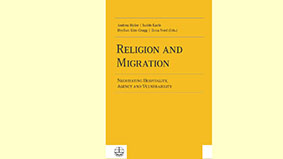/ Forschung
Neuerscheinung:

Religion und Migration: Negotiating Hospitality, Agency and Vulnerability /Hrsg. von Andrea Bieler, Isolde Karle, HyeRan Kim-Cragg und Ilona Nord
This volume explores religious discourses and practices of hospitality in the context of migration. It articulates the implied ambivalences and even contradictions as well as the potential contributions to a more just world through social interconnection with others.
The book features authors from diverse national, denominational, cultural, and racial backgrounds. Their essays explore the dichotomy of hospitality between guest and host, while tackling the meaning of home or the loss of it. By interrogating both the peril and promise of the relationship between religion, chiefly Christianity, and hospitality, special attention will be given to the role of migrants’ vulnerability and agency, by drawing from empirical, theological, sociological and anthropological insights emerged from postcolonial migration contexts.
With contributions by Ray Aldred, Andrea Bieler, Rafael Bohlen, Jione Havea, Claudia Hoffmann, Katja Höglinger, Claudia Jahnel, Isolde Karle, Julius-Kei Kato, HyeRan Kim-Cragg, Katherine Kunz, Buhle Mpofu, Ilona Nord, Henrietta Nyamnjoh, Regina Polak, Ludger Pries, Thomas Reynolds, and Jula Well.
[Religion und Migration]
Dieser Band beschäftigt sich mit religiösen Diskursen und religiöser Praxis, die Gastfreundschaft im Kontext von Migration thematisieren. Dabei werden sowohl Potenziale identifiziert, die in Richtung größerer Gerechtigkeit und sozialer Verbundenheit weisen, als auch Ambivalenzen und Widersprüche.
Das Buch präsentiert Beiträge, die verschiedene nationale, konfessionelle, kulturelle und ethnische Kontexte reflektieren. Dabei kommen die problematischen sowie die verheißungsvollen Dimensionen der Dichotomie von Gast- und Gastgebersein in den Blick, die der Fokus auf Gastfreundschaft insbesondere im Christentum impliziert. Die Frage nach dem Zusammenhang von Verletzbarkeit und Handlungsmacht von Migrantinnen und Migranten wird aus empirischer, theologischer, soziologischer sowie anthropologischer Perspektive beleuchtet.
Weitere Informationen erhalten Sie hier.
Quick Links
